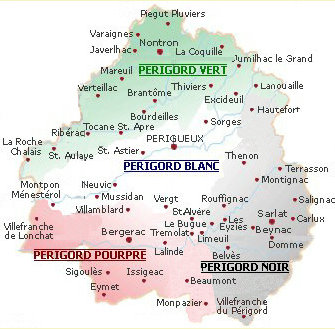
In this section we passed from the region of Limousin into that of Aquitaine, and into the department of the Dordogne. In pre-revolutionary times, this area was the province of Périgord and was divided loosely into the green, the white, the purple and the black sections.
The hilly Périgord Vert that we came into first was originally a land of great forests and swamps, and although a lot has since been cleared for farmland, a large part of it is now protected by the Parc Naturel Régional Périgord-Limousin.
Further down, near the town of Périgueux, we entered Périgord Blanc, reportedly named for the chalky limestone cliffs of the big river valleys. Beyond that again is Périgord Pourpre, the flat, fertile land around Bergerac, famous for its orchards and vineyards, and over to the east Périgord Noir, also heavily forested in the past, and priding itself now on its truffles.
This part of our walk was nearest we ever got to being true pilgrims. We had stayed in a pilgrim gîte in Flavignac, with all the ritual of the stamping of the créanciale and the entries in the Book of Gold, and did the same for the next three days. Not only that, we had the company of a pair of pilgrims from the Low Countries, with whom we formed a strong friendship.
The walking was easy amongst small hills, and the weather managed to hold itself together most of the time, although the rain at night made us grateful to be under a roof.
Day 17: Flavignac to la Coquille
Day 18: La Coquille to Sorges
Day 19: Sorges to Périgueux